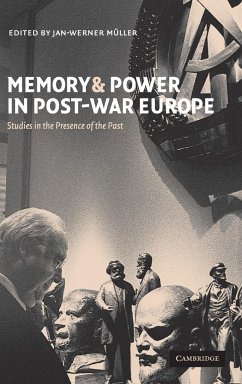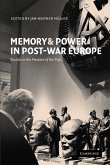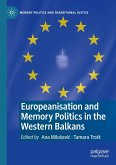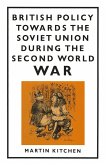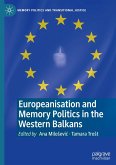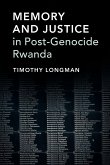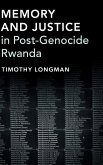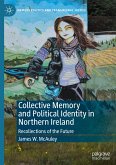- Gebundenes Buch
- Merkliste
- Auf die Merkliste
- Bewerten Bewerten
- Teilen
- Produkt teilen
- Produkterinnerung
- Produkterinnerung
This book is the first to examine the connection between memory and politics directly.
Andere Kunden interessierten sich auch für
![Memory and Power in Post-War Europe Memory and Power in Post-War Europe]() Jan-Werner Müller (ed.)Memory and Power in Post-War Europe38,99 €
Jan-Werner Müller (ed.)Memory and Power in Post-War Europe38,99 €![Europeanisation and Memory Politics in the Western Balkans Europeanisation and Memory Politics in the Western Balkans]() Europeanisation and Memory Politics in the Western Balkans97,99 €
Europeanisation and Memory Politics in the Western Balkans97,99 €![British Policy Towards the Soviet Union During the Second World War British Policy Towards the Soviet Union During the Second World War]() Martin KitchenBritish Policy Towards the Soviet Union During the Second World War68,99 €
Martin KitchenBritish Policy Towards the Soviet Union During the Second World War68,99 €![Europeanisation and Memory Politics in the Western Balkans Europeanisation and Memory Politics in the Western Balkans]() Europeanisation and Memory Politics in the Western Balkans97,99 €
Europeanisation and Memory Politics in the Western Balkans97,99 €![Memory and Justice in Post-Genocide Rwanda Memory and Justice in Post-Genocide Rwanda]() Timothy LongmanMemory and Justice in Post-Genocide Rwanda36,99 €
Timothy LongmanMemory and Justice in Post-Genocide Rwanda36,99 €![Memory and Justice in Post-Genocide Rwanda Memory and Justice in Post-Genocide Rwanda]() Timothy LongmanMemory and Justice in Post-Genocide Rwanda104,99 €
Timothy LongmanMemory and Justice in Post-Genocide Rwanda104,99 €![Collective Memory and Political Identity in Northern Ireland Collective Memory and Political Identity in Northern Ireland]() James W. McAuleyCollective Memory and Political Identity in Northern Ireland97,99 €
James W. McAuleyCollective Memory and Political Identity in Northern Ireland97,99 €-
-
-
This book is the first to examine the connection between memory and politics directly.
Hinweis: Dieser Artikel kann nur an eine deutsche Lieferadresse ausgeliefert werden.
Hinweis: Dieser Artikel kann nur an eine deutsche Lieferadresse ausgeliefert werden.
Produktdetails
- Produktdetails
- Verlag: Cambridge University Press
- Seitenzahl: 302
- Erscheinungstermin: 27. Juli 2015
- Englisch
- Abmessung: 235mm x 157mm x 22mm
- Gewicht: 644g
- ISBN-13: 9780521806107
- ISBN-10: 0521806100
- Artikelnr.: 35455482
- Herstellerkennzeichnung
- Libri GmbH
- Europaallee 1
- 36244 Bad Hersfeld
- gpsr@libri.de
- Verlag: Cambridge University Press
- Seitenzahl: 302
- Erscheinungstermin: 27. Juli 2015
- Englisch
- Abmessung: 235mm x 157mm x 22mm
- Gewicht: 644g
- ISBN-13: 9780521806107
- ISBN-10: 0521806100
- Artikelnr.: 35455482
- Herstellerkennzeichnung
- Libri GmbH
- Europaallee 1
- 36244 Bad Hersfeld
- gpsr@libri.de
JAN-WERNER MÜLLER is a fellow at All Souls College, Oxford.
Introduction: The power of memory, the memory of power and the power over
memory Jan-Werner Müller; Part I. Myth, Memory and Analogy in Foreign
Policy: 1. Memory of sovereignty and sovereignty over memory; Poland,
Lithuania and Ukraine since 1939 Tim Snyder; 2. Myth, memory and policy in
France since 1945 Robert Gildea; 3. The power of memory and memories of
power: the cultural parameters of German foreign policy making since 1945
Thomas U. Berger; 4. The past in the present: British Imperial memories and
the European Question Anne Deighton; 5. Memory, the media and NATO:
information intervention in Bosnia-Hercegovina Monroe E. Price; 6. Europe's
post-Cold War memory of Russia Iver B. Neumann; Part II. Memory, Power and
Justice in Domestic Affairs: 7. The past is another country: myth and
memory in postwar Europe Tony Judt; 8. The emergence and legacies of
divided memory: Germany and the Holocaust after 1945 Jeffrey Herf; 9.
Unimagined communities: the power of memory and the conflict in the former
Yugoslavia Ilana R. Bet-El; 10. Translating memories of war and
co-belligerency into Cold War politics: the Italian case Ilaria Poggiolini;
11. Institutionalizing the past: shifting memories of nationhood in German
education and immigration policies Daniel Levy and Julian Dierkes; 12.
Trials, purges or history lessons: treating a difficult past in
post-communist Europe Timothy Garton Ash.
memory Jan-Werner Müller; Part I. Myth, Memory and Analogy in Foreign
Policy: 1. Memory of sovereignty and sovereignty over memory; Poland,
Lithuania and Ukraine since 1939 Tim Snyder; 2. Myth, memory and policy in
France since 1945 Robert Gildea; 3. The power of memory and memories of
power: the cultural parameters of German foreign policy making since 1945
Thomas U. Berger; 4. The past in the present: British Imperial memories and
the European Question Anne Deighton; 5. Memory, the media and NATO:
information intervention in Bosnia-Hercegovina Monroe E. Price; 6. Europe's
post-Cold War memory of Russia Iver B. Neumann; Part II. Memory, Power and
Justice in Domestic Affairs: 7. The past is another country: myth and
memory in postwar Europe Tony Judt; 8. The emergence and legacies of
divided memory: Germany and the Holocaust after 1945 Jeffrey Herf; 9.
Unimagined communities: the power of memory and the conflict in the former
Yugoslavia Ilana R. Bet-El; 10. Translating memories of war and
co-belligerency into Cold War politics: the Italian case Ilaria Poggiolini;
11. Institutionalizing the past: shifting memories of nationhood in German
education and immigration policies Daniel Levy and Julian Dierkes; 12.
Trials, purges or history lessons: treating a difficult past in
post-communist Europe Timothy Garton Ash.
Introduction: The power of memory, the memory of power and the power over
memory Jan-Werner Müller; Part I. Myth, Memory and Analogy in Foreign
Policy: 1. Memory of sovereignty and sovereignty over memory; Poland,
Lithuania and Ukraine since 1939 Tim Snyder; 2. Myth, memory and policy in
France since 1945 Robert Gildea; 3. The power of memory and memories of
power: the cultural parameters of German foreign policy making since 1945
Thomas U. Berger; 4. The past in the present: British Imperial memories and
the European Question Anne Deighton; 5. Memory, the media and NATO:
information intervention in Bosnia-Hercegovina Monroe E. Price; 6. Europe's
post-Cold War memory of Russia Iver B. Neumann; Part II. Memory, Power and
Justice in Domestic Affairs: 7. The past is another country: myth and
memory in postwar Europe Tony Judt; 8. The emergence and legacies of
divided memory: Germany and the Holocaust after 1945 Jeffrey Herf; 9.
Unimagined communities: the power of memory and the conflict in the former
Yugoslavia Ilana R. Bet-El; 10. Translating memories of war and
co-belligerency into Cold War politics: the Italian case Ilaria Poggiolini;
11. Institutionalizing the past: shifting memories of nationhood in German
education and immigration policies Daniel Levy and Julian Dierkes; 12.
Trials, purges or history lessons: treating a difficult past in
post-communist Europe Timothy Garton Ash.
memory Jan-Werner Müller; Part I. Myth, Memory and Analogy in Foreign
Policy: 1. Memory of sovereignty and sovereignty over memory; Poland,
Lithuania and Ukraine since 1939 Tim Snyder; 2. Myth, memory and policy in
France since 1945 Robert Gildea; 3. The power of memory and memories of
power: the cultural parameters of German foreign policy making since 1945
Thomas U. Berger; 4. The past in the present: British Imperial memories and
the European Question Anne Deighton; 5. Memory, the media and NATO:
information intervention in Bosnia-Hercegovina Monroe E. Price; 6. Europe's
post-Cold War memory of Russia Iver B. Neumann; Part II. Memory, Power and
Justice in Domestic Affairs: 7. The past is another country: myth and
memory in postwar Europe Tony Judt; 8. The emergence and legacies of
divided memory: Germany and the Holocaust after 1945 Jeffrey Herf; 9.
Unimagined communities: the power of memory and the conflict in the former
Yugoslavia Ilana R. Bet-El; 10. Translating memories of war and
co-belligerency into Cold War politics: the Italian case Ilaria Poggiolini;
11. Institutionalizing the past: shifting memories of nationhood in German
education and immigration policies Daniel Levy and Julian Dierkes; 12.
Trials, purges or history lessons: treating a difficult past in
post-communist Europe Timothy Garton Ash.

